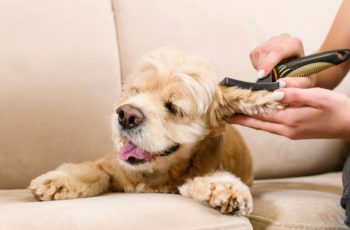Puppies take our breath away. No one can resist the melting endearment a puppy generates within us. From the moment we set eyes on them and establish a companionship that will last a lifetime, we simply want them to be as happy as possible.
But several circumstances could shadow our pup’s joyous puppyhood: puppy diarrhea is a common nemesis to puppy wellbeing. This condition worries many pet parents in addition to being a discomforting annoyance.
The first time your puppy has diarrhea, it may go slightly unnoticed. You have good reasons to be concerned by the second time this occurs, though. That’s why it’s wise to lose all of your fear of feces and get comfortable with watching your dog’s poo: observation is key in early detection of fecal irregularities in pets. This strange habit will reward you with less time in the vet, loads of money saved, and an overall healthy pup growth for your best friend.
So, let’s get to it.
Six Common Reasons Behind Puppy Diarrhea
Diarrhea is a common symptom of several conditions. Here’s a practical list of the six most common causes of diarrhea in puppies, as listed by the American Kennel Club.
- Change in diet or food intolerance.
- Bacterial infection
- Viral infection
- Garbage, toxins, or foreign body ingestion.
- Parasites
- Stress
As you can see, the reasons can range from a simple change in diet to a potentially lethal viral or bacterial infection. Think of diarrhea as your puppy’s body’s unique way (and yours too!) of telling you something may be wrong with their gastrointestinal tract.
Observe your puppy keenly, paying special attention to signs such as lethargy, refusal to eat and drink, weakness or collapse, tremors or seizures, vomiting more than once, and coughing/sneezing/eye or nasal discharge.
If you notice these symptoms, take your puppy to the vet immediately.
Types of Puppy Diarrhea
When it comes to puppy stool, don’t turn your head away. Puppy poo provides us with valuable information as to what is going on inside their gastrointestinal tract. You may observe distinct types of diarrhea in your dog’s stool.
Soft Stool
Soft stool is a precursor to diarrhea. If the stool doesn’t have signs of blood and your puppy is active and shows no other signs of concern, you don’t need to rush your pet to the vet. It is, however, important to keep an eye out to see if the soft stool develops a more liquid, diarrhea-like consistency.
If you notice soft stool talk to your vet about it.
Diarrhea with Mucus
Diarrhea with mucus has a more stringy, gel-like consistency and may appear sticky. The inflammation of the colon walls causes this type of diarrhea. A little bit of mucus in the diarrhea isn’t something to worry about unless it’s accompanied by other signs of concern (such as lethargy, no eating, weakness, vomiting), which we’ve already mentioned.
Yellow Diarrhea
If you notice your dog’s stool has a yellowish look, this is because of an increased movement in the intestines provoked by an inflammation. This could be a symptom of various medical conditions. But keep in mind that a yellow coloration in the feces is also produced when your dog eats rice and chicken, which is often recommended they eat when they have an upset stomach.
So, if the yellow diarrhea is seen immediately after eating rice with chicken, it could be a sign that their intestines are responding well and stool is gradually forming a healthier consistency.
Diarrhea with Blood
The presence of blood in the diarrhea often means colonic inflammation caused by something as simple as ingestion of an inappropriate object, parasites, or a serious viral or bacterial infection. Parvovirus or E. coli are two common and serious viruses that may infect puppies and cause bloody diarrhea.
If you observe some blood in your puppy’s stool and they’re active, don’t despair: Call your vet and discuss it with them. If this scenario involves lethargy, vomiting, respiratory difficulty, eye or nasal discharge, or sneezing, take them in immediately.
Treating Puppy Diarrhea
Now that we’ve covered the various ways diarrhea may show up let’s look at how to treat it. Your vet clinician is the only one qualified to correctly diagnose the root cause of diarrhea and provide a fitting approach. But here are some common management your vet could recommend for treating puppy diarrhea.
See also

Medication
Several conditions could require medication. Many pharmaceuticals are in the market for treating puppy diarrhea, from vet-prescribed drugs to remedies bought over the counter.
- Antibiotics: Oral antibiotics could be used to treat mild cases of bacterial infection. More severe scenarios could require hospitalization. Some vets may recommend using antibiotics in puppies with a viral infection since puppies are prone to secondary bacterial infections.
- Anti-emetics: These drugs are used to relieve nausea and vomiting symptoms.
- Anti-parasitic medication: If parasites are causing your puppy’s diarrhea, it’s wise to treat your dog with an anti-parasitic that is specific for the type of parasite in your dog. This could be combined with probiotics to promote gut health.
- Metronidazole: This medication kills anaerobic bacteria (that do not require oxygen to stay alive) and protozoa parasites. It’s often used to treat some types of inflammation in the digestive tract. Metronidazole is an FDA-approved medication for human use, but it’s not FDA-approved for animals. However, veterinarians can legally prescribe it as an “extra-label” remedy. Only give this medication to your puppy if your vet prescribes it.
Changes in the Diet
- A bland diet with protein: Boiled chicken and rice is a good way to treat mild cases of dietary intolerance.
- Fiber: Adding fiber to your puppy’s diet could help relieve your puppy’s gastrointestinal tract stress. Puppy-safe foods with fiber are smashed pumpkin, sweet potatoes, carrots, and whole grains. Add this food very gradually to their diet.
- Probiotics: Probiotics are healthy bacteria that help keep the gut healthy. They also support a strong immune system. There are many dog-intended probiotics on the market. You can ask your vet for recommendations.
Foreign Object Ingestion/Things to Avoid
We know puppies are young and exploring the world; it’s normal for them to accidentally ingest something they should not. Make sure your puppy stays clear of any substance that could be foreign to their organism.
As for our foods, keep your puppy away from the following: chocolate, caffeine, grapes, raisins, alcohol, raw bread dough, xylitol (a common sweetener), onions, garlic, and many dairy products.
A Word About Vaccination
Vaccination is a medical practice that prevents your dog from getting infected by many viruses and bacteria that could be potentially fatal. Many of these viruses and bacteria could be responsible for your puppy’s diarrhea, and some could have devastating effects on them.
Make sure to always keep your dog up to date with their vaccines.
Conclusion
Puppies are adorable, but not their diarrhea. All kidding aside, diarrhea is a serious concern for us pet parents. Talk to your trusted vet if you notice your dog has diarrhea. Keep informed on all you can do to ensure they have a happy and carefree puppyhood.


